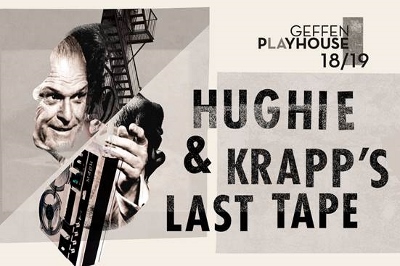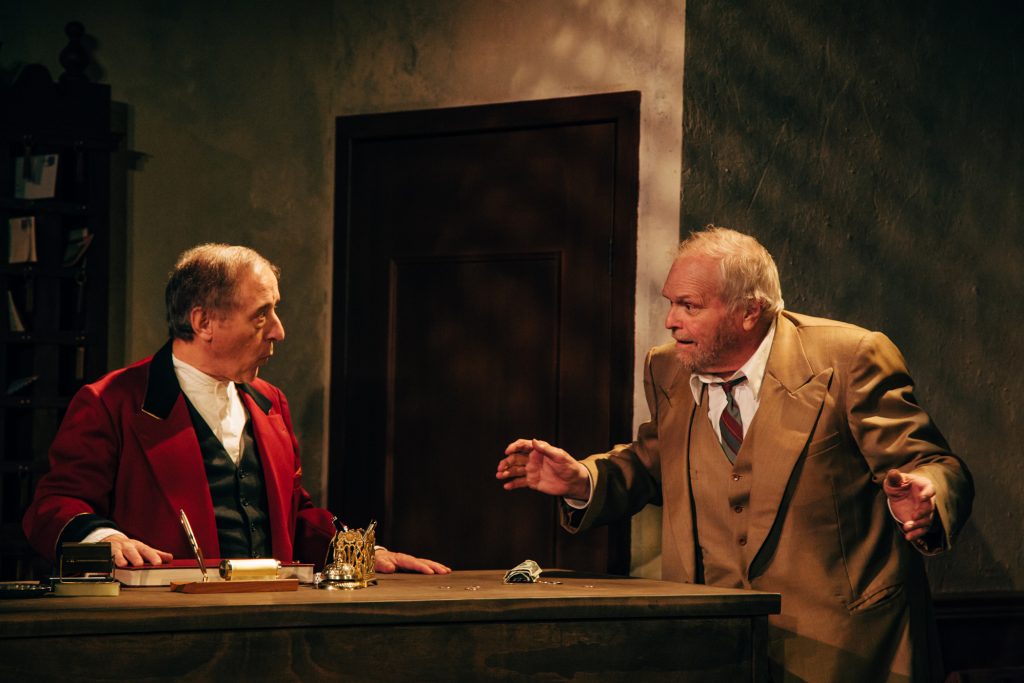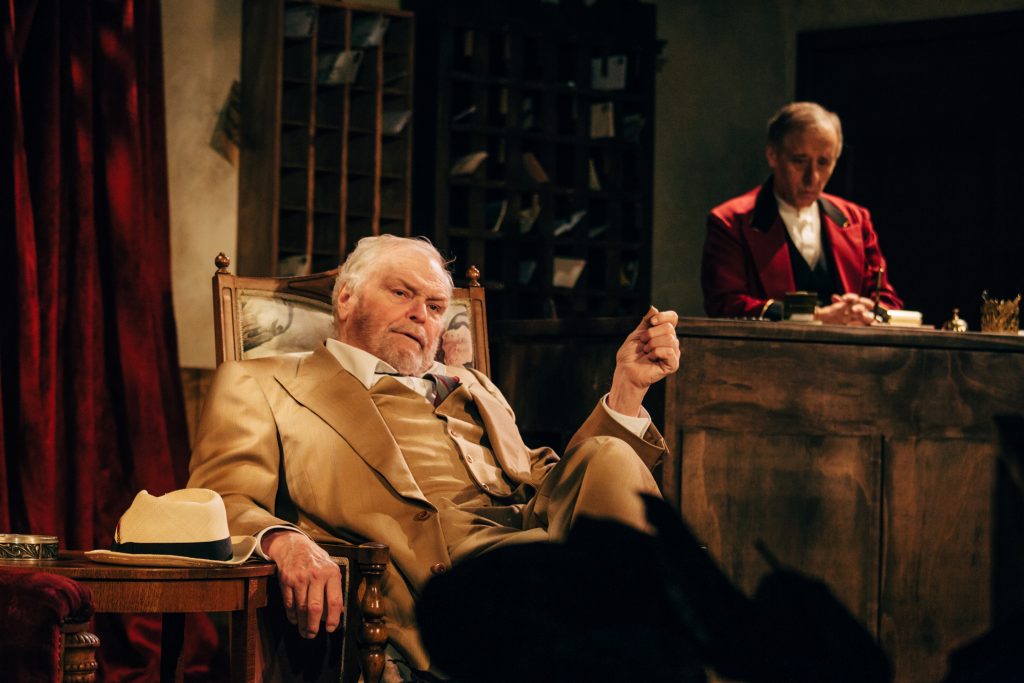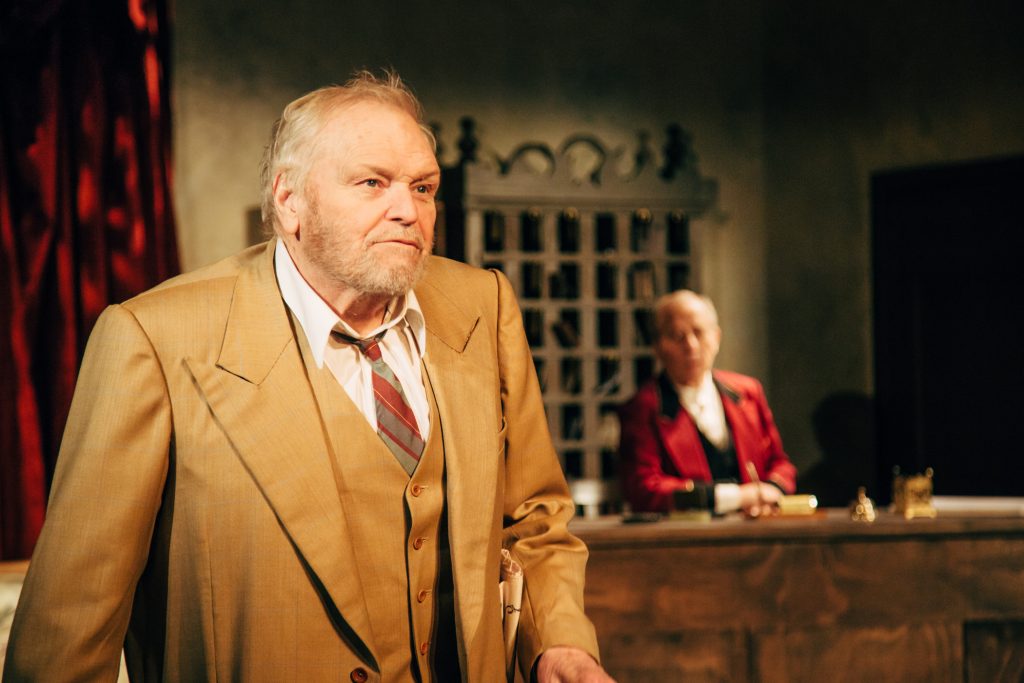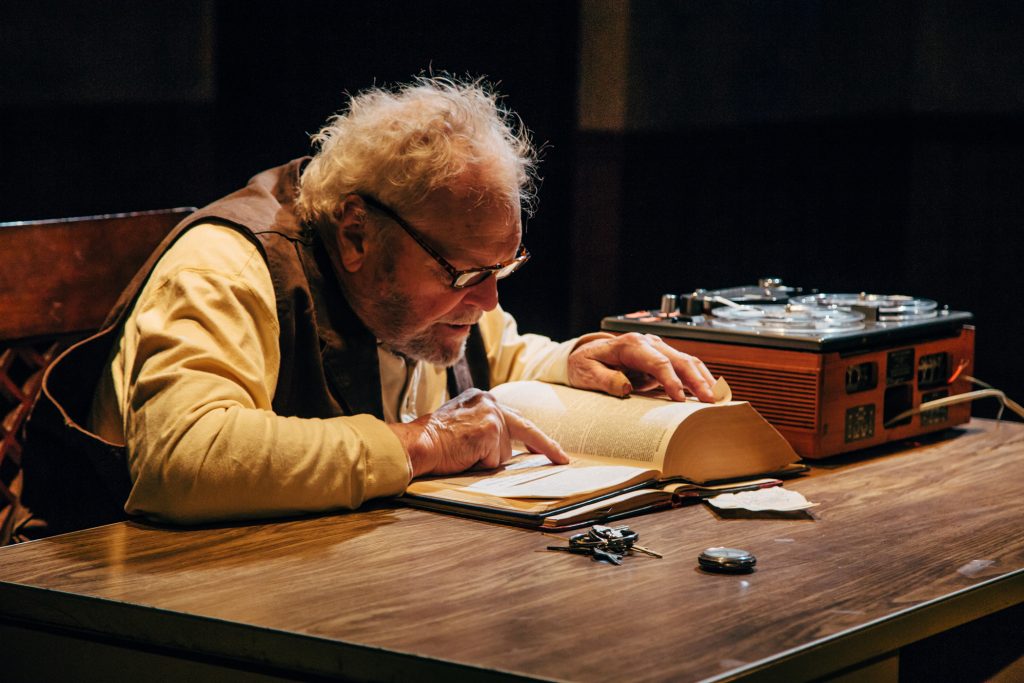BEAUTIFUL DESPAIR BY A MASTER THESPIAN
The river of lost souls can be found in Westwood, and your magnificent tour guide is Brian Dennehy. In this coupling of one-acts by Eugene O’Neill and Samuel Beckett, Dennehy supplies the concentrated crux of regret by embodying how time shreds our delusions. At the same time, with brilliant effortlessness, he confirms his standing as the Zeus of actors who can bring to life elderly men raging against the dying of the light. He is a theatrical force to be reckoned with, and witnessing this titan in such close proximity is a privilege. Dennehy performed this same double-bill at Chicago’s 856-seat Goodman Theatre; here he is mere feet from us at the Geffen Playhouse’s 120-seat Audrey Skirball-Kenis Theatre, which for the record has some horrific design flaws creating true sight-line issues; from my third-row seat, half of my view was blocked by patrons in front of me; I recommend getting seats towards the back where there is a rake, or — if you’re lucky — in the front row.
O’Neill’s Hughie (1942) and Beckett’s Krapp’s Last Tape (1958) make a terrific twosome. Since the first is about 45 minutes, and the second 55, it’s amazing how many companies provide just one play. Here, it makes for a bounteous evening of theater. Though at first glance the two plays seem dramatically different – and there’s no question that they indeed are – it is the similarities in these two stories that pull this double bill together. Both are comedy-laced dramas that delve deeply into loss, depression and loneliness. Both involve the painful exploration of a man’s life. Both are by scribes of Irish descent who proved to be giants of 20th-century drama, and both follow shabby blokes who have spent a lifetime ensconced in their own tattered accounts of their monomyth, a hero’s journey which has brought them where we all end up: nowheresville.
But it’s the differences between the two pieces that come through most clearly here.
Penned between his masterpieces The Iceman Cometh and Long Day’s Journey into Night, O’Neill wrote Hughie as part of a grand yet unfinished work: seven short one-acts that would essentially be monologues about someone recently departed (it’s technically a two-hander but practically a monologue). Published in 1959, it was performed on Broadway by Jason Robards (1964), Ben Gazzara (1975), Al Pacino (1996) and Forrest Whitaker (2016).
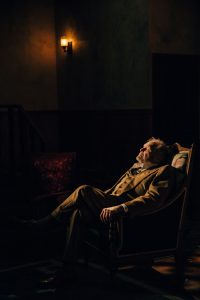 Meet Erie Smith, a small-time Broadway gambler whose only friend, the titular night clerk at the fleabag hotel where he stays, has died. Coming off a days-long bender prompted, so he claims, by Hughie’s demise, Erie tries to reproduce his association with his departed confrère by befriending the new night clerk — whose surname, coincidentally, is Hughes (an understated Joe Grifasi, who has been performing this with Dennehy since 2004).
Meet Erie Smith, a small-time Broadway gambler whose only friend, the titular night clerk at the fleabag hotel where he stays, has died. Coming off a days-long bender prompted, so he claims, by Hughie’s demise, Erie tries to reproduce his association with his departed confrère by befriending the new night clerk — whose surname, coincidentally, is Hughes (an understated Joe Grifasi, who has been performing this with Dennehy since 2004).
We learn about Hughie, sure, but it is Erie’s pathetic regretful life story that rings out in his elaborate fantasies about playing the horses and high life with all the Follies girls. Erie needs Hughie to impress in order to feed his ego and give his lousy life meaning. Always the master conman, he piques the interest of the new clerk, getting what he’s always desperately wanted: someone to connect with in a cold, lonely city.
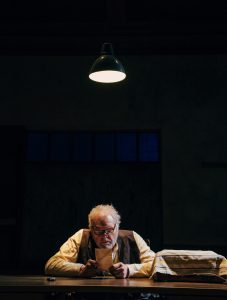 Set in 1928 (Erie is crashing just ahead of the stock market), Hughie contains that creaky Bowry Boys period vernacular. But Dennehy gives it an unforced freshness and fire. “He lapped up my stories like a saucerful of heroin,” says Dennehy’s sodden gamester of his dead pal, and whether it’s true or not, we believe he believes it.
Set in 1928 (Erie is crashing just ahead of the stock market), Hughie contains that creaky Bowry Boys period vernacular. But Dennehy gives it an unforced freshness and fire. “He lapped up my stories like a saucerful of heroin,” says Dennehy’s sodden gamester of his dead pal, and whether it’s true or not, we believe he believes it.
No such trickeries adhere to Krapp, whose only onstage buddy is his own voice — recorded 30 years earlier — that plays on a reel-to-reel recorder sitting atop a vintage metal desk (the magnificent directional sound is by Cricket S. Myers). Trapped in a dark den with a single interrogatory light hanging overhead (stunning film noir lighting by Daniel Ionazzi), Dennehy’s grizzled Krapp celebrates his birthday — more or less — by playing through tapes made by his younger self, a would-be writer who believed he was at the “crest of the wave — or thereabouts.” The old Krapp interacts with his younger self (and to some extent, us), laughing and cursing and searching for a capitulation with time and memory that stops short of resignation.
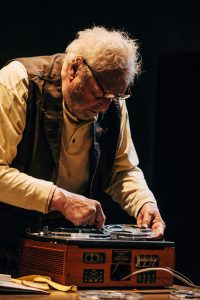 Beckett’s mordant wit still gets ample play – the 80-year-old Dennehy does an outstanding take on the famous banana-peel pratfall — but this is a dark ride overall.
Beckett’s mordant wit still gets ample play – the 80-year-old Dennehy does an outstanding take on the famous banana-peel pratfall — but this is a dark ride overall.
The difference between Erie and Krapp (besides the fact that Beckett’s alienated protagonist lacks even a first name) is that Erie can still delude himself and at least one other person. Krapp can’t. The genius in pairing these two pieces is that we’re forced to ask ourselves which is worse: delusion or the lack of same? That dichotomy carries through in Sibyl Wickersheimer’s beautifully realized sets (I love that antique tin of Pasadena Biscuit Company’s “Blue Stem Favorettes” which contains Krapp’s old tapes). Hughie‘s Times Square hotel retains just enough traces of its former comforts to suggest that it and Erie had a heyday once.
Dennehy’s worn-out Krapp is denuded of belief in anything except the sorrowful awareness that he’s spent a lifetime chasing the wrong dreams. Erie had the ear of his night-shift confessor, and the younger Krapp had the comforts of women whose love he took for granted. What does this solitary Krapp have in his final hours? Dennehy paints a heart-wrenching portrait of what it means to see — or more accurately, hear — oneself as one truly is.
photos by Jeff Lorch
Hughie / Krapp’s Last Tape
Audrey Skirball Kenis Theater at the Geffen Playhouse
10866 Le Conte Avenue in Westwood
Tues-Fri at 8; Sat at 3 & 8; Sun at 2 & 7
ends on December 16, 2018
for tickets, call 310.208.5454 or visit Geffen Playhouse
